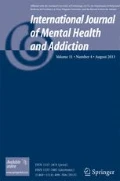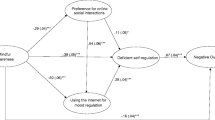Abstract
Much concern has been raised of late regarding factors predicting vulnerability to addictive behaviors in general and most recently those related to the newly emerging area of risk of excessive and addictive patterns of use on the internet, including social media and gaming. The current study was designed to investigate the relationship between levels of addictive patterns of internet usage (as related to social media) and perceived self-efficacy among university-aged students in Palestine (a country with some of the highest levels of internet addiction). The sample consisted of 505 university students, selected randomly across area of study. Results indicated a high negative relationship between excessive internet use/addictive patterns of use and perceived self-efficacy. Findings conversely showed no significant differences in internet addiction and perceived self-efficacy dependent on area of study, gender, age or academic level. These conclusions illuminate concerns related to factors of vulnerability as well as possible negative effects of excessive internet use and self-efficacy, especially in the highly sensitive group of university students where behavioral patterns may lead to lifelong habits and/or interfere with developmental and educational tasks and demands. In addition, as self-efficacy is known to be a risk factor in both symptoms of depression and suicidal ideation, further research into this relationship may be critical in devising interventions to both reduce internet addiction and increase self-efficacy during the critical life period of late adolescence.
Similar content being viewed by others
Change history
10 February 2021
A Correction to this paper has been published: https://doi.org/10.1007/s11469-019-00187-x
References
Abu Ghazal, M., & Alawneh, S. (2010). School justice and its relationship to perceived self-efficacy among a sample of school students in Irbid Governorate: developmental study. Damascus University Journal, 26(4), 285–317.
Akin, A., & Iskender, M. (2010). Social self-efficacy, academic locus of control, and internet addiction. Computers in Education, 54(12), 1101–1106. https://doi.org/10.1016/j.compedu.2009.10.014.
Andreou, E., Didaskalou, E., & Vlachou, A. (2013). Bully/victim problems among Greek pupils with special educational needs: associations with loneliness and self-efficacy for peer interactions. Journal of Research in Special Educational Needs, 15(4), 235–246. https://doi.org/10.1111/1471-3802.12028.
Bandura, A. (2001). Social cognitive theory: an argentic perspective. Annual Review of Psychology, 52, 1–26. https://doi.org/10.1146/annurev.psych.52.1.1.
Bandura, A. (2002). Social cognitive theory in cultural context. Applied Psychology. An International Review, 51(2), 269–290. https://doi.org/10.1111/1464-0597.00092.
Benight, C., & Bandura, A. (2004). Social cognitive theory of posttraumatic recovery: the role of perceived self-efficacy. Behaviour Research and Therapy, 42, 1129–1148.
Mahamid, F. A., & Berte, D. Z. (2018a). Social media addiction in geopolitically at-risk youth. International Journal of Mental Health and Addiction, 17(1), 102–111. https://doi.org/10.1007/s11469-017-9870-8.
Mahamid, F. A., & Berte, D. Z. (2018b). Portrayals of violence and at-risk populations: symptoms of trauma in adolescents with high utilization of social media. International Journal of Mental Health and Addiction. https://doi.org/10.1007/s11469-018-9999-0.
Betz, N. E., & Hermann, K. S. (2004). Path models of the relationships of instrumentality and expressiveness to social self-efficacy, shyness, and depressive symptoms. Sex Roles, 51(1-2), 55–66. https://doi.org/10.1023/B:SERS.0000032309.71973.14.
Betz, N. E., & Schifano, R. S. (2000). Evaluation of an intervention to increase realistic self-efficacy and interests in college women. Journal of Vocational Behavior, 56(1), 35–52. https://doi.org/10.1006/jvbe.1999.1690.
Betz, N. E., & Smith, H. M. (2002). An examination of efficacy and esteem pathways to depression in young adulthood. Journal of Counseling Psychology, 49, 438–448. https://doi.org/10.1037/0022-0167.49.4.438.
Bianchi, A., & Phillips, J. G. (2005). Psychological predictors of problem mobile phone use. Cyber Psychology & Behavior, 8(1), 39–51.
Boehmer, S., Knoll, N., Luszczynska, A., Mohamed, N., & Schwarzer, R. (2005). Dispositional self-efficacy as a personal resource factor in coping after surgery. Personality and Individual Differences, 39(4), 807–818. https://doi.org/10.1016/j.paid.2004.12.016.
Baumeister, R. F. (1991). Escaping the self: alcoholism, spirituality, masochism, and other flights from the burden of selfhood. New York, NY: Harper Collins.
Chiu, S. (2014). The relationship between life stress and smartphone addiction on Taiwanese university student: a mediation model of learning self-efficacy and social self-efficacy. Computers in Human Behavior, 34(4), 49–57.
Chiu, S.-I., Hong, F.-Y., & Chiu, S.-L. (2013). An analysis on the correlation and gender difference between college students’ internet addiction and mobile phone addiction in Taiwan. ISRN Addiction, 2013, 1–10. https://doi.org/10.1155/2013/360607.
Chung, C., Kwon, J., & Lee, J. (2011). The effects of escape from self and interpersonal relationship on the pathological use of internet games. Community Mental Health, 47, 113–121. https://doi.org/10.1007/s10597-009-9236-1.
Craparo, G., Messina, R., Severino, S., Fasciano, S., Cannella, V., Gori, A., et al. (2014). The relationships between self-efficacy, internet addiction and shame. Indian Journal of Psychological Medicine, 36(3), 302–307.
Concepts Technologies. (2017). Digital and Social Media Report in Palestine. Retrieved from https://socialstudio.me/wp-content/uploads/2018/04/SMRP2017EnglishFinal.pdf.
Coombs, H. (2004). Handbook of addictive disorders: a practical guide to diagnosis and treatment. Hoboken, NJ: John Wiley & Sons, Inc..
Davis, R.(2001). A cognitive-behavioral model of pathological internet use. Computers in Human Behavior, 17, 187-195. Doi.org/10.1007/s11469-017-9870-8.
Eastin, M., Lin, C., & Robert, L. (2003). Unregulated internet usage: addiction, habit, or deficient self-regulation? Media Psychology, 5(3), 225–253. https://doi.org/10.1207/S1532785XMEP0503_01.
Esen, B., & Gundogdu, M. (2010). The relationship between internet addiction, peer pressure and perceived social support among adolescents. Educational Research, 2(1), 29–36.
Gant, M., & Shaw, L. (2002). In defense of the Internet: the relationship between internet communication and depression, loneliness, self-esteem, and perceived social support. Cyberpsychology & Behavior, 5(2), 157–171. https://doi.org/10.1089/109493102753770552.
Ha, J., Kim, S., Bae, S. C., Bae, S., Kim, H., Sim, M., Lyoo, I. K., & Cho, S. (2007). Depression and internet addiction in adolescents. Psychopathology, 40, 424–430. https://doi.org/10.1159/000107426.
Ha, J. H., Chin, B., Park, D. H., Ryu, S. H., & Yu, J. (2008). Characteristics of excessive cellular phone use in Korean adolescents. Cyberpsychology & Behavior, 11(6), 783–784. https://doi.org/10.1089/cpb.2008.0096.
Halley, M., Mark, D., & Ivone, M. (2014). Internet addiction and loneliness among children and adolescents in the education setting: an empirical pilot study. Aloma, 2(1), 91–98.
Hong, Y., Chiu, I., & Huang, H. (2012). A model of the relationship between psychological characteristics, mobile phone addiction and use of mobile phones by Taiwanese university female students. Computers in Human Behavior, 28(6), 2152–2159. https://doi.org/10.1016/j.chb.2012.06.020.
Irena, S., Norman, H., & Xiaobin, H. (2010). Time on the Internet at home, loneliness, and life satisfaction: evidence from panel time-diary data. Computers in Human Behavior, 26(10), 329–338. https://doi.org/10.1016/j.chb.2009.11.002.
Kim, J. (2008). The effect of a R/T group counseling program on the internet addiction level and self-esteem of internet addiction university students. International Journal of Reality Therapy, 10(2), 1–10.
Kim, D., & Jeong, E. (2011). Social activities, self-efficacy, game attitudes, and game addiction. Cyber Psychology, Behavior, and Social Networking, 14(4), 213–221. https://doi.org/10.1089/cyber.2009.0289.
Kim, H. H., & Davis, K. E. (2009). Toward a comprehensive theory of problematic internet use: evaluating the role of self-esteem, anxiety, flow, and the self-rated importance of internet activities. Computers in Human Behavior, 25, 490–500. https://doi.org/10.1016/j.chb.2008.11.001.
Lee, S. B., Lee, K. K., Paik, K. C., Kim, H. W., & Shin, S. K. (2001). Relationship between internet addiction and anxiety, depression, and self efficacy in middle and high school students. Korean Neuropsychiatry Assoc, 40(6), 1174–1184.
Luszczynska, A., Scholz, U., & Schwarzer, R. (2005). The general self-efficacy scale: multicultural validation studies. The Journal of Psychology, 139(5), 439–457. https://doi.org/10.3200/jrlp.139.5.439-457.
McLaughlin, D., & Whitty, M. (2007). Online recreation: the relationship between loneliness, internet self-efficacy and the use of the Internet for entertainment purposes. Computers in Human Behavior, 23, 1435–1446. https://doi.org/10.1016/j.chb.2005.05.003.
Napoleoncat. (2019). Facebook users in State of Palestine. Retrieved from https://napoleoncat.com/stats/facebook-users-in-state_of_palestine/2019/07.
Odaci, H., & Celik, C. (2016). Internet dependence in an undergraduate population: the roles of coping with stress, self-efficacy beliefs, and sex role orientation. Journal of Educational Computing Research, 55(3), 395–409. https://doi.org/10.1177/0735633116668644.
Odaci, H. (2013). Risk-taking behavior and academic self-efficacy as variables accounting for problematic internet use in adolescent university students. Children and Youth Services Review, 35, 183–187. https://doi.org/10.1016/j.childyouth.2012.09.011.
Odaci, H. (2011). Academic self-efficacy and academic procrastination as predictors of problematic internet use in university students. Computers in Education, 57(7), 1109–1113. https://doi.org/10.1016/j.compedu.2011.01.005.
Pesigan, I., & Shu, U. (2016). Cognitive and psychosocial health risk factors of social networking addiction. International Journal of Mental Health and Addiction, 14(4), 550–564. https://doi.org/10.1007/s11469-015-9612-8.
Sari, S., & Aydin, B. (2015). Internet addiction among adolescents: the role of self-esteem. Procedia - Social and Behavioral Sciences, 15(2), 3500–3505. https://doi.org/10.1016/j.sbspro.2011.04.325.
Schunk, D. H., & Pajares, F. (2002). The development of academic self-efficacy. In A. Wigfield & J. S. Eccles (Eds.), Development of achievement motivation (pp. 16–32). San Diego, CA: Academic Press.
Schwarzer, R., & Warner, L. M. (2013). Perceived self-efficacy and its relationship to resilience. In S. Prince-Embury & D. H. Saklofske (Eds.), The Springer series on human exceptionality. Resilience in children, adolescents, and adults: Translating research into practice (pp. 139-150). New York, NY, US: Springer Science + Business Media. https://doi.org/10.1007/978-1-4614-4939-3_10
Walsh, S. P., White, K. M., Cox, S., Young, R., & Mc. D. (2011). Keeping in constant touch: the predictors of young Australians’ mobile phone involvement. Computers in Human Behavior, 27(1), 333–342. https://doi.org/10.1016/j.chb.2010.08.011.
Yao, M. Z., & Zhong, Z. (2014). Loneliness, social contacts and Internet addiction: A cross-lagged panel study. Computers in Human Behavior, 30, 164–170. https://doi.org/10.1016/j.chb.2013.08.007.
Young, K. S. (2004). Internet addiction: a new clinical phenomenon and its consequences. American Behavioral Scientist, 48(4), 402–415. https://doi.org/10.1177/0002764204270278.
Young, K. S. (2012). Internet addiction: the emergence of a new clinical disorder. CyberPsychology & Behavior Journal, 1(3), 237–244.
Yu, S., Wu, A. M. S., & Pesigan, I. J. A. (2015). Cognitive and psychosocial health risk factors of social networking addiction. International Journal of Mental Health and Addiction, 14(4), 550–564. https://doi.org/10.1007/s11469-015-9612-8.
Author information
Authors and Affiliations
Corresponding author
Additional information
Publisher’s Note
Springer Nature remains neutral with regard to jurisdictional claims in published maps and institutional affiliations.
Rights and permissions
About this article
Cite this article
Berte, D.Z., Mahamid, F.A. & Affouneh, S. Internet Addiction and Perceived Self-Efficacy Among University Students. Int J Ment Health Addiction 19, 162–176 (2021). https://doi.org/10.1007/s11469-019-00160-8
Published:
Issue Date:
DOI: https://doi.org/10.1007/s11469-019-00160-8




